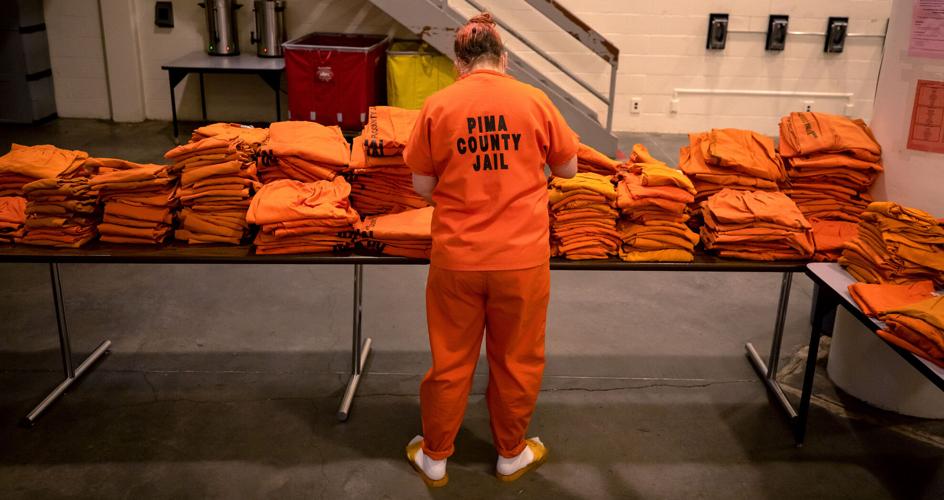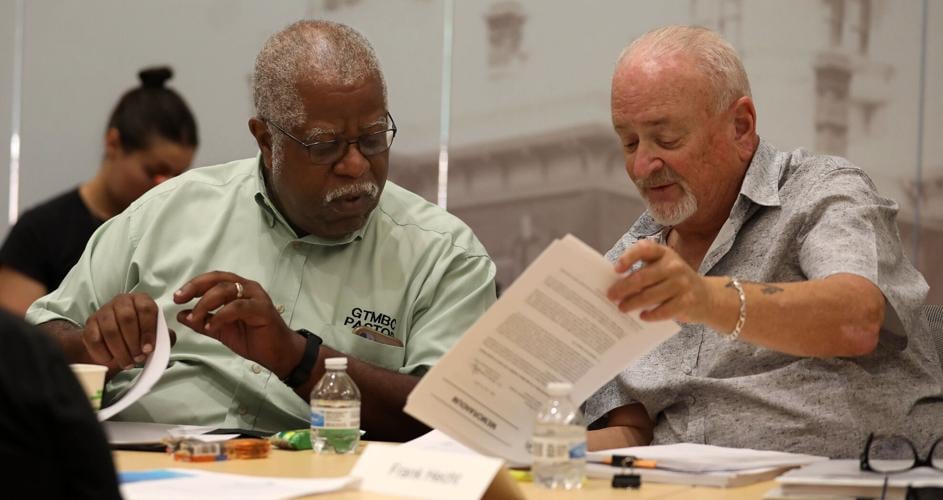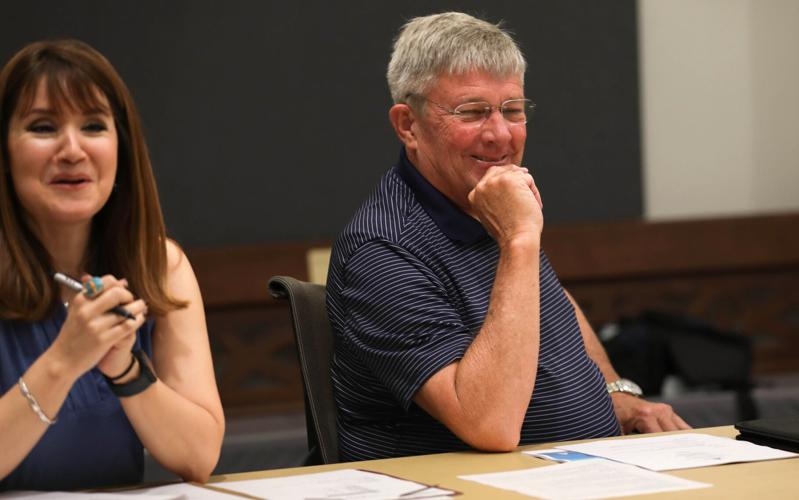A commission set up to help decide whether Pima County should build a new jail is close to finishing its term, but critics say it has failed to consider a major issue at the facility: the numerous inmate deaths and how many people are being housed there.
The up to $380 million it is estimated to build a new facility could be better spent on social services, activists say.
The 10-person Blue Ribbon Commission was appointed by the Pima County administrator in December 2022 to recommend whether it makes sense to build a new facility that could cost taxpayers between $250 million and $380 million. A half-cent sales tax would fund it.
But community members and activists say crucial issues are missing from their scope, including a rising number of deaths and overpopulation in the existing jail. Activists say the money could be better spent on social services.
“I don’t know how deaths in the jail, services in the jail, or programming in the jail are outside of the scope of a commission that is evaluating whether this county is going to hand over the keys of a new facility over to the same sheriff …,” said Mia Burcham, an organizer for a group called No Jail Deaths. “It’s just nonsensical.”
The commission, which has met four times, will hold a public hearing on Aug. 10 and is expected to make its recommendations in September.
The commission in its July meeting said it expects pushback from the public. However, they stated that funding social programs is not within their “scope,” which the commission has not firmly defined.
The commission plans to address severe maintenance issues in the jail and how the jail will support an ever-increasing jail population.
Pima County Sheriff Chris Nanos says two main goals for building a new facility would be to fix maintenance problems such as extreme leaks and establish direct supervision over inmates.
“I believe that the best and safest way to take care of not just your staff, but your inmates as well … is to provide what we call a direct supervision jail,” he said, explaining that a new facility would provide an infrastructure that would allow inmates to be constantly monitored.
Nanos said the new jail facility should have very minimal doors and viewing spots from above where correctional officers can observe inmates. He said he believes this would allow correctional officers to respond faster to overdose, suicide, homicide and medical emergencies.
Nanos said he agrees with some critics of building a new jail that social services are very important.
Nanos suggested that there are better people including medical professionals and social workers who are equipped to take care of the mentally ill and homeless.
“Why should they say you have to be arrested first to get the services you need?” he said.
Nevertheless, he is proposing spending hundreds of millions of dollars to build a bigger jail that can accommodate more people.
Nanos says the Sheriff’s Department generally recruits 18– to 20-year-olds to be correctional officers since they’re too young to become deputies. Nanos said they are heavily psychologically evaluated and undergo a trial period before being hired, however, they are not trained social workers or doctors.
The Blue-Ribbon Commission said that the existing jail already is designed for direct supervision. Their main concerns are maintenance and making more space for beds.
During the July meeting, there was little mention of decreasing the jail population. When it was mentioned, the conversation was quickly dismissed since that is not within “the scope” of the commission’s purpose.
Jack Obrien, a commissioner and public defender, said that the jail could continue the same practices during COVID that decreased the jail population. But Capt. Scott Lowing of the Pima County Sheriff’s Department said it would be very difficult to get law enforcement agencies to cooperate like that again.
All of the construction projects proposed by commission member Paul Wilson, former PCSD bureau chief, include more bed space for the projected increase in population, which Wilson said could reach 3,162 beds in 20 years. Wilson did not propose a feasible plan to divert the money elsewhere.
The commissioners agreed that diversion programs such as drug rehabilitation, aid for the houseless population, and mental health services were important. However, they were not fully considered by the commission.
“The programs need to be there,” said commission member Grady Scott.
Fellow commissioner Jack O’Brien said those programs also need to grow, but both members’ suggestions were dismissed by the full commission because of a lack of relevance.
Burcham of No Jail Deaths said she worries that the scope of the commission is “nebulously defined.” She said it is unclear what the commission is meant to address and that it has veered from the original intention.
Burcham said she wonders how the conditions that led to a large number of deaths aren’t relevant to building a new jail. She describes the goal of the commission as a “moving target.”
Burcham said that reducing the jail population would be a free way to sustain the jail and prevent deaths. No Jail Deaths point to Pima County Attorney Laura Conover, who has promised to “reform cash bail, end all use of capital punishment, divert cases of substance use disorder and mental illness to treatment, and protect people with vulnerable immigration statuses.”
Conover’s office declined to comment citing her role in representing all the county entities involved.
Decarceration is “eminently possible; it’s a matter of political will” and that the commission takes attention away from conversations about solutions, Burcham said.
She proposes providing additional funding for housing and care for those suffering from homelessness, poverty, mental health issues and drug abuse that follows them throughout their lives. Instead of building a new jail, she said she hopes the county will invest money in case workers who have enough time and resources to provide this meaningful and transformative care.
Dave Smith, chairman of the Pima County Republican Party, is curious why a facility that was built in the 1980s already has so many problems. He wonders if it points to a problem with the building or with the management.
“The question becomes if we put the money into a new jail, and we maintain poor management, then it doesn’t make things better,” Smith said.
Smith said he would like to see a study to show how effective a new jail would be in solving the underlying problems at the jail including the rising number of inmate deaths.
“I don’t believe building a new jail is the answer,” said Danny Howe, who owner the Earnest House, which offers affordable transitional housing for those recently incarcerated, experiencing homelessness and suffering from substance abuse. “I think if we change the culture of the staff in the jail (that) would be a huge start.”
He said he believes the money would be better invested in already existing social programs.
Marisol Winfrey Herrera, a community activist said, “What this is about, is the dignity of a human person, those who continue to jail people in great numbers and keep them in bad conditions are lacking love and not recognizing personhood.”
Longtime Tucson resident Tiera Rainey, the executive director of the Tucson Bail fund, said she finds many contradictions and holes in Nanos’ proposition. Rainey references a December 2022 case of an inmate who died as a result of ingesting non-food items such as toothbrushes and a pencil, according to the Pima County medical examiner’s report.
“I don’t see how the facilities have anything to do with Fentanyl overdose or folks dying from ingesting (nonfood items) over months,” she said.
Rainey echoed Howe and said it would be a better use of county resources to invest in already existing social programs.
“The reason why you will continue to have bad healthcare outcomes is because the county would rather pour money into a ‘better cage’ but won’t put that money into actual community resources,” she said.
Get your morning recap of today's local news and read the full stories here: http://tucne.ws/morning






